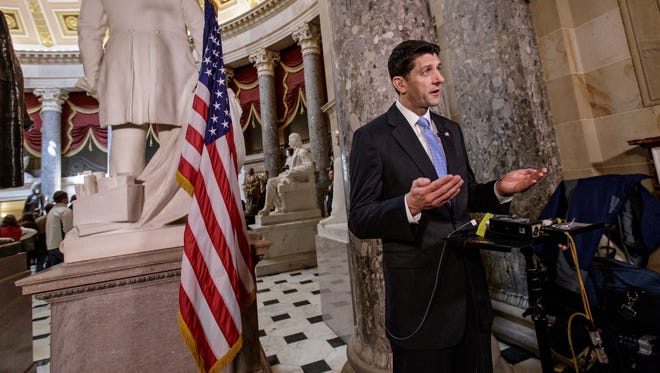Why Republicans can't put everything they want in their health care bill

WASHINGTON — As Republicans continue to negotiate potential changes to their health care overhaul bill to get it through the House, they’re limited in the modifications they can make that could survive the rules of the Senate.
"Unfortunately, because of Senate rules, we can’t put everything in the bill that we would like to," House Majority Leader Kevin McCarthy, R-Calif., told CNN on Thursday after acknowledging the expected vote on the bill would be postponed at least a day.
"It’s our hope that we’d be voting tomorrow," McCarthy said.
The changes some hardline conservatives are seeking include repealing the Affordable Care Act's requirement that insurance plans cover specific benefits such as prescription drugs, mental health services and maternity benefits. Although House Speaker Paul Ryan, R-Wis., had previously said Senate rules required such changes be made in separate legislation, the issue emerged again as a negotiating point as Republicans tried to round up enough votes.
Democrats were quick to point out that such additions to the bill could be only temporary.
“I think it’s important that folks in the Freedom Caucus who are negotiating on that point realize that the leadership is taking them to the cleaners,” said Maryland Sen. Chris Van Hollen, a Democrat on the Senate Budget Committee. “They’re promising them something that they know will not survive in the Senate. That’s a little bit of a bait and switch.”
Here’s a look at what how Senate rules could affect what happens next:
Why can’t Republicans put whatever they want into the health care bill?
Republicans chose an expedited procedural route to replace Obamacare in order to avoid a filibuster by Senate Democrats, which would require 60 votes to end. But that route restricts them to making changes affecting how much the government spends or collects in taxes. So if they want to change, for example, insurance regulations, that may not be allowed.
Who determines what can be in the bill?
Once the House sends a bill to the Senate, the Senate Budget Committee would consult with the Senate parliamentarian to come up with a list of provisions that might violate the rules.
Is it clear what provisions would or would not be allowed?
No. While some provisions might not directly affect federal spending, they could have a large enough indirect effect that they would be allowed. For example, repealing what benefits insurance companies have to include would make plans cheaper, which could prompt more people to buy insurance with the help of the bill’s tax credits. That would mean the cost of the bill would go up.
So while the parliamentarian is guided by past rulings, there’s still a lot of gray area, said Ed Lorenzen, a budget expert at the nonpartisan Committee for a Responsible Federal Budget.
“On a lot of places, it is a matter of a balancing test,” Lorenzen said. “The big issue is going to be, are the budgetary effects merely incidental to the provision?”

What do we know from past attempts to repeal Obamacare?
Lorenzen said the best indication of what would be allowed is the Obamacare repeal bill the Senate passed in 2015 as a trial run. That bill, for example, did not repeal the requirement that insurance plans cover specific health benefits.
What other provisions could be challenged?
Senate Democrats argue provisions already in the GOP bill would violate the rules, including the option for states to impose a work requirement on some Medicaid recipients and barring the use of insurance premium subsidies to pay for abortion services.
Can Republicans include provisions in the bill even if they violate the rules?
Yes, but it would take 60 votes to waive the rules and approve those provisions. Republicans have only 52 Senate seats and Senate Democrats are expected to remain unified in opposition to the bill..
Can Democrats challenge the parliamentarian’s decision that a provision is allowed?
Yes, but Republicans can stop the challenge with 51 votes.

Can Vice President Pence, in his role as president of the Senate, overrule the decision of the parliamentarian?
Yes, but because that would be a significant change to precedent, Republicans might not stick together against a Democratic challenge. White House spokesman Sean Spicer declined to comment Thursday on whether Pence would follow the determination of the parliamentarian.
Could the whole bill be stopped because of rules violations?
In theory, the parliamentarian could decide there are too many provisions violating the rules to qualify for the Senate’s expedited procedures. But Lorenzen said he’s not aware that that’s happened before.
So if parts of the House bill are stripped out by the Senate, what happens next?
The bill would either have to go back to the House for a vote, or the House and Senate would try to agree on another version, which would then have to be voted on by both the House and Senate.
Read more:
Still no deal on Obamacare repeal after White House meeting